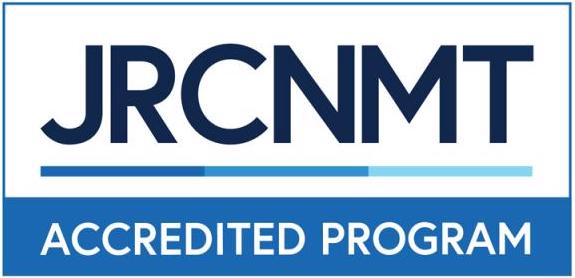The Nuclear Medicine & Molecular Imaging Sciences program is committed to providing high-quality education to prepare students with a solid educational background and a set of skills translatable to a variety of health care settings.
Our Learning Model
The NMMIS program provides an immersive individualized learning experience into the cutting-edge world of diagnostic and therapeutic nuclear medicine and molecular imaging sciences.
-
Individualized Learning
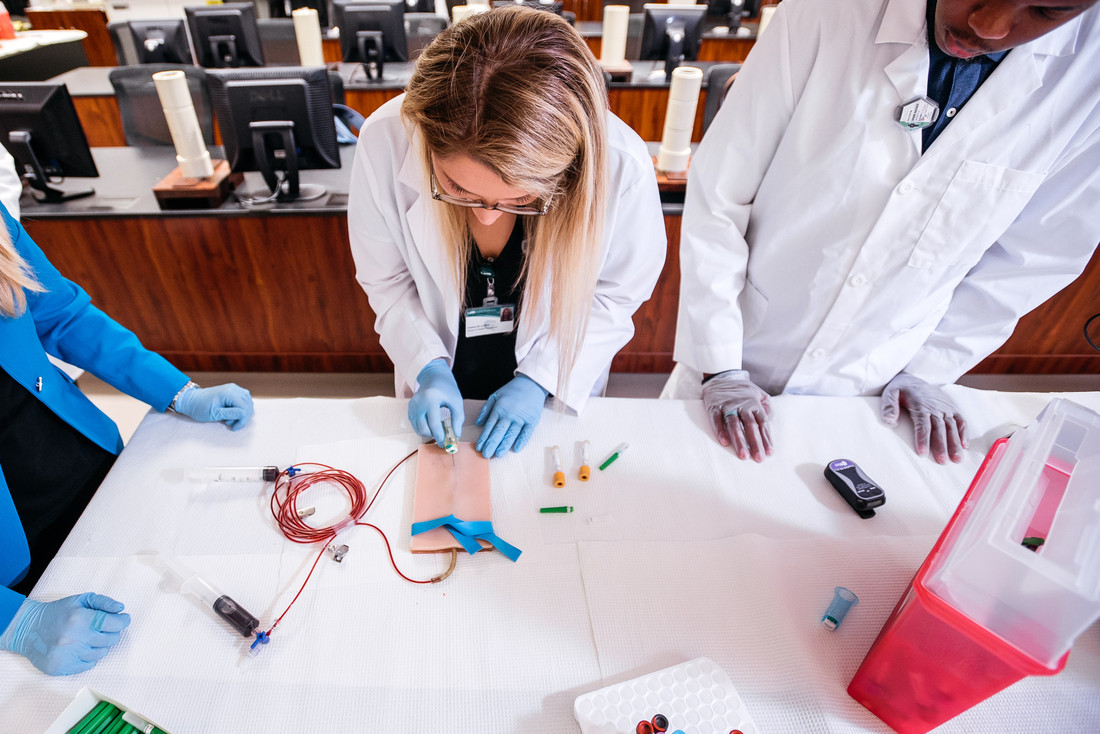 Each student’s learning is tailored to individual aptitudes and aspirations through the specialized learning tracks of Imaging Specialist, Radiation Safety Officer, and the Researcher track. A variety of instructional methods are used to enhance the student’s learning experiences in the program tailored to individual needs.
Each student’s learning is tailored to individual aptitudes and aspirations through the specialized learning tracks of Imaging Specialist, Radiation Safety Officer, and the Researcher track. A variety of instructional methods are used to enhance the student’s learning experiences in the program tailored to individual needs.
Traditional teaching methods include in-class tutorials, assignments, and course notes through the Learning Management System. Additional methods in some courses include the principles and practices of team-based learning, including individual and team applications, during which students problem-solve real world challenges and help guide the learning of members of the team. In addition, online tutorials and online guides to reading assignments provide structure for individualized learning.
Program faculty ensure that each student gets the special care and attention needed to thrive in the program and to reach the individualized learning goals.
-
Immersive Contemporary Topics
Students are initially introduced to a good foundational understanding of the field which is then built systematically to lead to cutting-edge topics. Labs are structured to reinforce foundational concepts using both basic and advanced instruments in UAB NMMIS state-of-the-art nuclear laboratory. Projects, presentations, and other learning activities are designed to make the transition of knowledge into practical application easier.
-
Structured Clinical Experience
Clinical experiences for the students run concurrently along with the didactic curriculum as students rotate through the various UAB NMMIS associated clinical sites during their tenure in the program. The clinical experiences are designed to compliment and reinforce the theoretical knowledge gained in class and contribute to a solid experiential learning for taking the board exams in preparation for a career.
-
Mentored Research
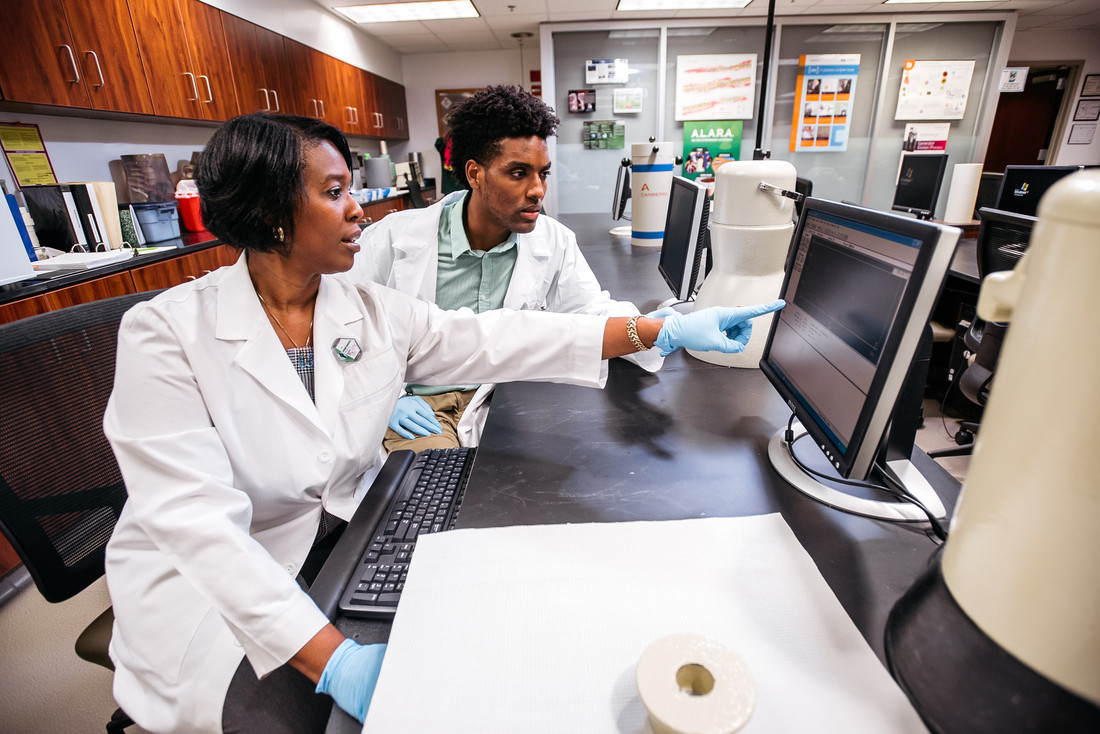 Each student gets the opportunity to perform cutting-edge research in a UAB-based laboratory under the direct supervision of a UAB mentor. The NMMIS program’s research advisory board is composed of renowned experts in the fields of nuclear medicine & molecular imaging, and radiation research. Students can choose to utilize the unique strength of nuclear medicine and molecular imaging to study the body’s physiological, metabolic, and biochemical processes in the areas of cardiovascular research, brain research and mapping, nuclear oncology, and other translational research areas. Other topics of research focus for the graduates include radiation biology, radiation protection, and practice management.
Each student gets the opportunity to perform cutting-edge research in a UAB-based laboratory under the direct supervision of a UAB mentor. The NMMIS program’s research advisory board is composed of renowned experts in the fields of nuclear medicine & molecular imaging, and radiation research. Students can choose to utilize the unique strength of nuclear medicine and molecular imaging to study the body’s physiological, metabolic, and biochemical processes in the areas of cardiovascular research, brain research and mapping, nuclear oncology, and other translational research areas. Other topics of research focus for the graduates include radiation biology, radiation protection, and practice management.
New Specialty Tracks
Continuing our tradition of excellence in education, we now offer three specialty tracks - we call this Nuclear Medicine +
-
Imaging Specialist Track
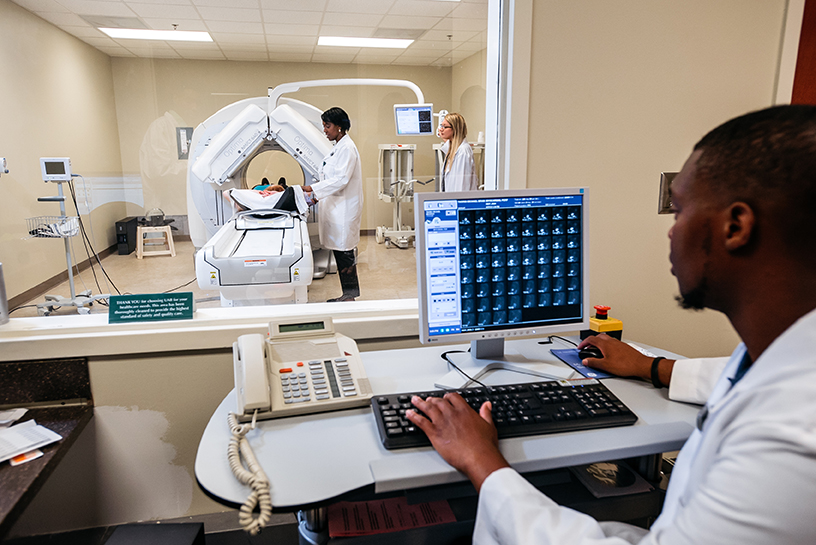 A unique track geared towards training the next generation of imaging and therapy leaders in the field of nuclear medicine and molecular imaging sciences.
A unique track geared towards training the next generation of imaging and therapy leaders in the field of nuclear medicine and molecular imaging sciences.
This customized learning track equips students to pursue specialized clinical and research training in general and hybrid imaging modalities including SPECT/CT, PET/CT, and PET/MR for aiding in the diagnosis and treatment of various types of cancers, heart diseases, and neurophysiological disorders. Guided by expert faculty, each student completes a set of core courses followed by track specific specializations, along with specialized courses and clinical training in world class hospitals affiliated to the program. The Imaging Specialist track culminates in a non-thesis research spanning two semesters.
After completion of the program, students have the option to sit for board certification exams including those offered by the Nuclear Medicine Technology Certification Board for becoming a certified nuclear medicine technologist – CNMT and certified computed tomography technologist – NMTCB(CT)) and the exams offered by the American Registry of Radiological Technologists – ARRT(N). Graduates will also be prepared for the didactic portion required to sit for the certification exam in magnetic resonance imaging, with an option for further clinical training in the area. Students in this track are also trained in the basics of securing biomedical data sets and to understand how to use data standards and terminologies in the context of machine learning for creating and analyzing biomedical data in order to answer molecular imaging research questions in nuclear medicine.
-
Radiation Safety Officer Track
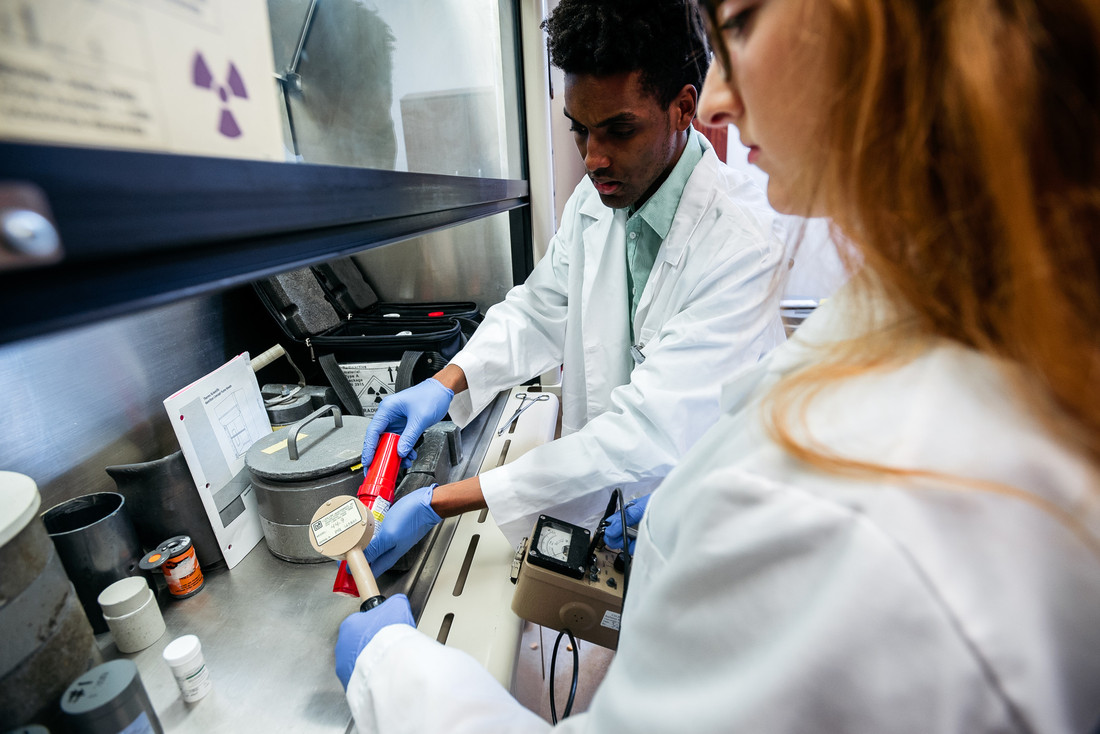 A unique track geared towards training the next generation of radiation safety leaders in the field of nuclear medicine and molecular imaging sciences. The customized learning track equips students to pursue specialized clinical and research training in nuclear medicine and molecular imaging sciences with specialized training in radiation protection applications in nuclear medicine.
A unique track geared towards training the next generation of radiation safety leaders in the field of nuclear medicine and molecular imaging sciences. The customized learning track equips students to pursue specialized clinical and research training in nuclear medicine and molecular imaging sciences with specialized training in radiation protection applications in nuclear medicine.
With guidance from expert faculty, each student completes a set of core courses followed by track specific specializations that would equip them to pursue careers in the hospital or in industry. This includes training in nuclear medicine radiation protection in conjunction with UAB’s Health Physics program, along with specialized courses and clinical training in world class hospitals affiliated to the program. The Radiation Safety Officer track culminates in a non-thesis research spanning two semesters.
After completion of the program, students have the option to sit for board certification exams including those offered by the Nuclear Medicine Technology Certification Board for becoming a certified nuclear medicine technologist – CNMT, the American Registry of Radiologic Technologists – ARRT(N), and the exams offered by the American Board of Science in Nuclear Medicine after completion of the required post-graduation field experience to work as radiation safety officers recognized by the United States Nuclear Regulatory Commission (USNRC).
-
Research Track
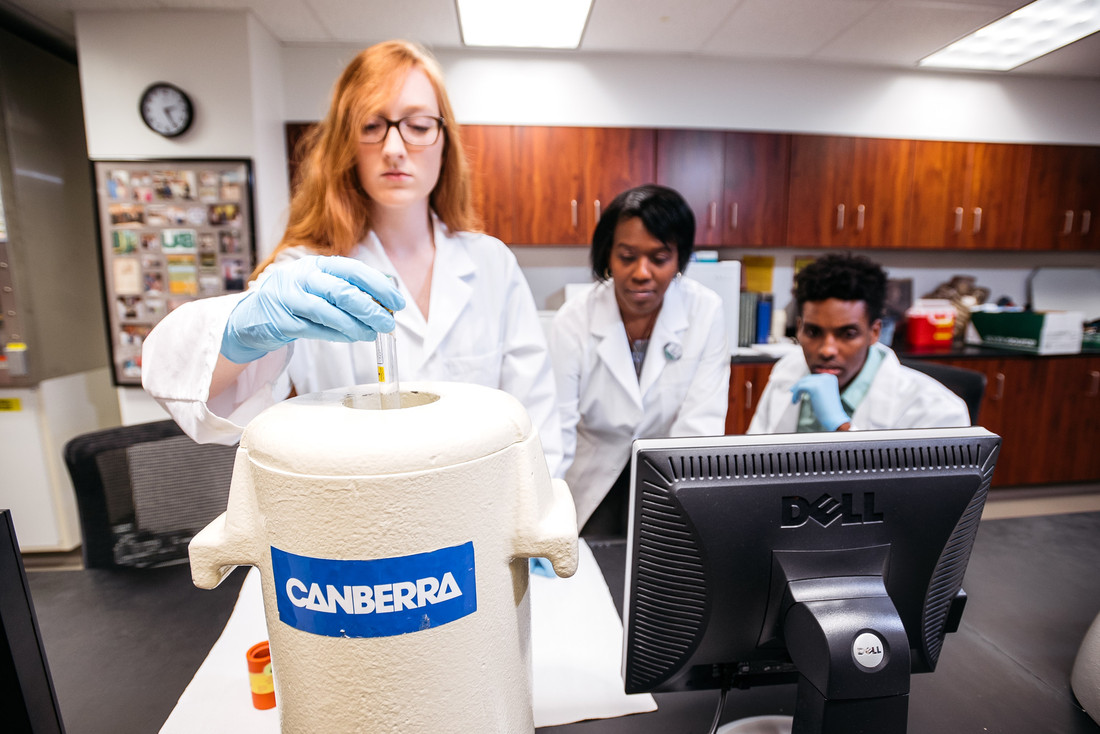 This unique track trains the next generation of research leaders in the field of nuclear medicine and molecular imaging sciences. The customized learning track equips students to pursue specialized clinical and research training in nuclear medicine and molecular imaging sciences with specialized training in research applications in nuclear medicine.
This unique track trains the next generation of research leaders in the field of nuclear medicine and molecular imaging sciences. The customized learning track equips students to pursue specialized clinical and research training in nuclear medicine and molecular imaging sciences with specialized training in research applications in nuclear medicine.
With guidance from expert faculty, each student completes a set of core courses followed by track specific specializations that would equip them to pursue careers in the hospital or in industry, including training in various lab and research methodologies, in-depth critical literature analyses, biostatistical applications, along with specialized courses and clinical training in world class hospitals affiliated to the program.
After completion of the program, students have the option to sit for board certification exam offered by the Nuclear Medicine Technology Certification Board for becoming a certified nuclear medicine technologist – CNMT, and work as research scientists with specialized skills, or pursue graduate studies in doctoral programs. The program track culminates in thesis research in the final semester, which requires coordination with the UAB Graduate School, forming a research committee, and dissertation requirements.
NOTE: You must make a decision to follow one of the three tracks before the end of your first term. You may not move between tracks once your decision is official.
Our Curriculum
Because our curriculum is subject to change, we ask you to use the convenient QR Code or click here for the most current curriculum and course descriptions in the UAB Graduate School Catalog.
